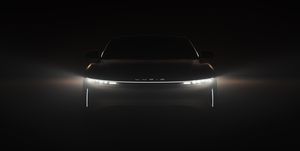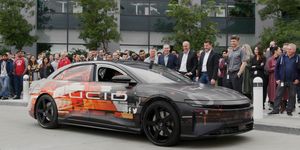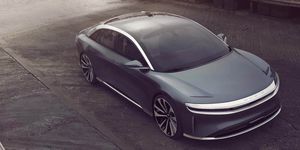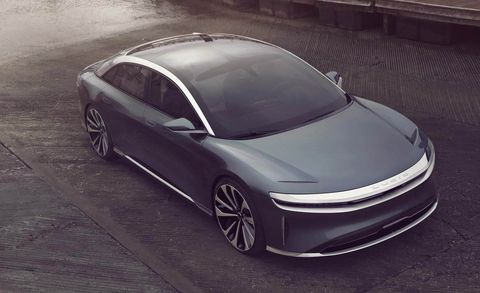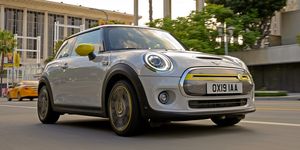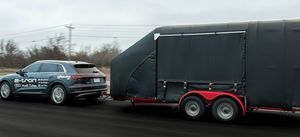- Lucid unveiled the Dream variant of its upcoming Air electric sedan at an event today for a couple hundred people who have already put down deposits. Note: Photos with this story are not the production model; we were not allowed to photograph that.
- The automaker’s intention is to compete with German luxury brands.
- Lucid says the car has already achieved more than 400 miles of range on a single charge in real-world testing.
Lucid CEO Peter Rawlinson places a carry-on bag on the stage at the company’s new showroom and headquarters in Newark, California. He pops it open and pulls out the Lucid Air’s motor, transmission, and inverter as one single piece. It’s a bit of showmanship for the automotive startup, but it’s also an illustration of the engineer turned boss’s plan to make the mechanics of the company smaller and more efficient while exuding an air (get it?) of luxury.
Ahead of the unveiling of the production-model Air, Lucid gave approximately 250 deposit holders a first look at the electric sedan ahead of the rest of the world. Red stickers were placed over the smartphone lenses of those in attendance, as photos were prohibited. But what was shown is nearly identical to the beta vehicles Lucid has been showing off—albeit shinier and with a proper interior.
The carry-on powertrain weighs all of 160 pounds but is expected to have an output of 600 horsepower and 2950 lb-ft of torque, Lucid claims. The all-wheel-drive Air will get two of them shoved into the automaker’s skateboard platform.
Between the motors will sit a 110.0-kWh battery pack that the company says will provide a range of more than 400 miles. On stage, Rawlinson told the audience that Lucid personnel drove one of their beta vehicles from Newark in Northern California to the Santa Monica Pier via the Pacific Coast Highway—a distance Google Maps gives as 411 miles—without stopping to charge, and with range to spare.
That’s an impressive claim from a 110.0-kWh battery pack connected to a charger that supports two-way power. In addition to charging at up 300 kW, the car can also power the house it’s plugged into, Lucid claims.
This shows, among other things, CEO Rawlinson’s obsession with efficiency and miniaturization. During a post-presentation interview he said: “I don’t measure an electric-car company’s progress by its battery size. Conversely, I wish we could have a smaller battery. Let’s look at range efficiency with the smallest possible battery. That’s the metric that really counts.”
To that end, the company originally said, back in 2016, that its 400-plus-mile range target would require a 130.0-kWh pack. Now it’s down to 110.0 kWh for the production model. A smaller battery means less weight and a lower cost. Rawlinson said that his vision over the next few years is to get to five miles per kilowatt-hour, which would be a feat. Consider that Tesla just boasted that its upcoming Model Y will be its more efficient vehicle at 4.1 miles per kilowatt-hour.
All that is wrapped in a vehicle that’s meant to compete with luxury sedans from Germany.
The interior, as C/D saw it today, displays the luxury that Lucid is going for. It’s modern minimalism with high-quality materials throughout. Nappa leather adorns the seats, and sheep or alpaca wool weaves accent the doors and dash, along with the obligatory Alcantara.
Lucid is offering five different interior color schemes all based on California locations: Santa Monica, Big Basin, Santa Cruz, Mojave, and Tahoe. Each is a variant meant to represent the region, and they include earth tones but also a lot of white, black, and beige.
The automaker has decided not to participate in the battle for the largest screens. Instead, the displays in the car look more subdued. Most of the controls are behind glass. To the left of the digital dash cluster, a small touchscreen houses secondary features such as windshield-wiper controls. A display on the dash houses the infotainment system, and a third screen in the center console is where the climate controls are fine-tuned.
The weirdest feature we spotted is that the center console display will retract into the dash, unveiling a storage area. Sadly, it was not demoed at the event.
Happy Customers, for Now
The attendees crowded around the vehicle as it rolled into the showroom. They seemed happy that they had put up the cash to be one of the first to take delivery of the EV from the new automaker. Production is expected to start by the end of the year at the company’s factory, currently being built in Arizona. We were shown video of the steel skeleton near completion.
Lucid is headquartered in Northern California, where CEOs take every opportunity to share with the world their excitement about changing the world. Rawlinson does believe his company and its tech can help make the planet a greener place, but he’s not ready to declare victory about what the company just rolled out to future owners.
“I feel until we get into production we haven’t changed anything,” he told Car and Driver. “I’m eternally optimistic. But I’m grounded in realism. Ultimately, I’m neutral.”
Rawlinson asserted that the company has “fantastic technology” but that many people don’t believe it’s real. Rawlinson was the head engineer on the Tesla Model S, so he knows a little something about working on a product that the world doesn’t believe is possible or will even make it to market.
Naysayers have a point: A lot can go wrong while building a factory. A construction delay could push the Lucid Air production timeline back, which could result in burning through more money and potential lost revenue from early adopters who might decide to drop their reservation and buy something else.
But Rawlinson and his team express confidence that their luxury EV sedan will fill an unfulfilled space in the automotive market: both fancy and efficient. In their minds, it’ll be something for the Model S owner who wants a bit more luxury or the S-class owner who wants something different and more eco-friendly.
The Lucid Air’s powerplant is supposed to propel the vehicle from zero to 60 mph in under 2.5 seconds. But it’s up to the company to move just as quickly to make that a reality.
Source: Motor - aranddriver.com

